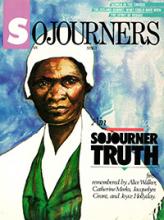On 1879, four years before Sojourner Truth died, a Louisville, Kentucky newspaper said of her, "The oldest truth nowadays is Sojourner." It was a tribute to both the seemingly boundless energy that still marked this remarkable woman's life as she entered her 83rd year, and to the fact that for decades she had traveled the country spreading the truth of the gospel.
Her early years as a slave had developed in Sojourner an intense passion for freedom, and she committed her life to the struggle to end human bondage. Seeing a vision of freedom for all as the only just goal, she argued vigorously against those who advocated postponing the fight for women's rights in favor of black rights, carrying in her own being proof that the issues could not be separated. Her voice rang out from one end of the country to the other in a call for women's suffrage and an end to slavery.
She relied on God's provision and the hospitality of strangers as she carried her message. She talked with authors and abolitionists, preachers and presidents. But most of all, she talked with God, with whom she had an unending conversation that began when she was a child and who was her source of guidance on every step of her journey.
Sojourner remained illiterate and once said of herself, "I can't read a book, but I can read the people." Indeed her understanding of human nature was profound, and she possessed a combination of fiery wit and gentle wisdom that had an effect on all who met her.
She not only agitated for the political rights of her people, she gave herself in service to their needs. When thousands of freed slaves left the South in the 1860s, she devoted her energies to those who fled to Washington, D.C. Crowded into squalid shanties, with no hope for education or employment, the freed slaves were discarded and forgotten by the society they had served. But Sojourner, then in her 70s, gave herself to every need.
Read the Full Article

